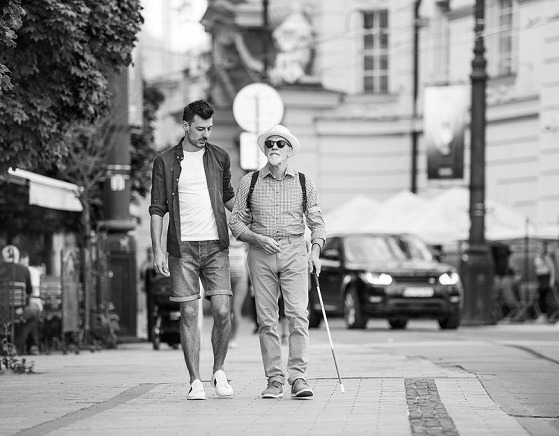The Blind Battle: A Different Kind of American Ecosystem.

{source}
“Oh, you’re young!”
His eyes turned to me, not seeing me, but seeming to appraise the air around me. Eyes that I could discern through the curving, amber convexity of his lenses as a sliver of light shone through the edges, Apollonian and bright.
Eyes that for a moment caught the sun and yet were unaffected, no wince or squint concealed them from my view, no constriction effected them, they seemed to belong to another place, damp like veined marbles left out on a foggy summer day. They reflected the environment with opalescent opacity, yet belonged to their own atmosphere.
Eyes that held the mist of a distant summer in San Francisco, and I wondered if they’d ever seen one.
“Barely!” I exclaimed, an overly effusive tone exuding from me that I’m often unable to quell when speaking to elderly people that I don’t know. A loudness too, it rang in the space between us, me holding his arm, the thin poplin of his jacket creeping beneath my sweaty fingers, the seconds were clicking away from us and we had only just begun our journey.
The time permitted to pedestrians in SF to cross the chaotic streets had never felt brief to me. Holding this man’s arm, thin yet not frail, sinewy from articulating his silver rod that taps the ground before him, I felt the press of time.
I felt the creep of anxiety prick around my neck with heated intensity, I glanced at drivers looking at screens that navigate the city for them, a city unknown to them, but a city they fill each day.
They didn’t see us, he didn’t see them, and I saw scenarios scatter in front of me like marbles flickering across a floor, each containing enclosed potential universes of color and light. Perfect orbs that couldn’t know the kinetic chaos their collisions could cause in their inwardly gazing encasement.
We made it in time, the penultimate click of a second coinciding with his steel staff finding the concrete of sidewalk. I let go of his arm, crumpled beige darkened the color of wet sand from my hand. We made our introductions and farewells, we now have a smoother routine when our paths cross on the fog-wreathed swells of Russian Hill.
I wonder who finds him when I’m not there, his brave lean into a world unseen, throwing him clues from his memory interacting with the scrapes and taps of his steel envoy.
I have moments like this often now, the rare time capsules of older SF interacting with the wild expansion of a city billowing ever larger, full of citizens with their heads in vastly different clouds.
The blueprints traced in the mind’s eye of older denizens, steeped in nostalgia and slower rhythms, and the new cloud capital that formulates a world of enterprise and engulfs those who can’t keep up in its carnivorous cumulus.
This experience was in a way an inversion of dialogue that has been happening in the collective, as far as I can discern it. A negative image that illuminated in opposition what my own lens concealed from my vision.
It seems that there’s been an intensification of animosity in the discourse surrounding generational relations of late. I wonder what we’d be able to witness if we came from a place of trying to see from another lens, to experience something outside the self-contained bounds of our own journeys.
Much of what I’ve seen in the polarized conversation between younger adults and people in their middle age is from the perspective of the younger generation that largely feels betrayed by their elders. The younger set is coming to maturity amid devolution, a deterioration that’s seen as incited by the greed, negligence and apathy of our elders.
Systems both societal and natural appear to be failing, and instead of acknowledging this, some of our elders would evidently rather focus on the sensitivities and the perceived flaws in character of those that are coming of age amid an age of decline.
As the late-stage decadent West reportedly degenerates, there’s often recrimination and reactivity more than responsiveness in Western societies. So many people have voiced their opinions on the causes, the solutions or lack thereof, and I believe it’s all valid.
The pain, rage, betrayal and bitterness all belong to this moment, they will all resonate differently with people at different levels and are important in their expression of energy, at whatever space they inhabit, whatever octave they vibrate in.
For me, holding the trembling arm of someone older than me, as the seconds counted down, as two streams of mechanized motion seethed on either side ready to swallow anything too slow or feeble in their consuming blindness, in a city that’s being built on the promise of tomorrow’s brilliant creations while crushing the blueprints of the past, there was an invitation to empathize.
San Francisco is unlike other places where the battle of the generations wages in that the younger generation dominates the realms of social ease and material comfort. Unlike other places where the children of the postwar baby boom hold sway, here enterprise has chosen youth and innovation as its vessels of capitalist reign.
Holding on to an older body in the crux of this seething maelstrom, I was able to process the fear of a different kind of collapse, another variation of flux.
By being bound to a body too slow and misaligned for the fragmenting environment, I was able to see and feel that the battle that burns between these generations is wound in the same fear, a fear of dissolution before overpowering forces, a fear of destruction, of death.
As I moved with my charge, the pace agonizingly slow, my body flooded with stress hormones. I was unable to abate them with swiftness, with movement (my panacea).
In the inverted mirror image of wealth, youth and power that reflects a different kind of American ecosystem (though no more sustainable, perhaps), I felt the fear of annihilation brought by physical decline, instead of the material descent of the external realm of civilization.
There’s a beauty to change in the body, to cycles of maturity that spiral into completion. When respecting nature’s design and ceding to natural law, there’s a perfection and richness to be found in slowing down. A grace that’s revealed in the release of speed and precision in movement that people can attain in later stages of life.
This is part of cyclic existence, of self-acceptance, of fully occupying your stage with presence and awareness.
This is not the sensation that I experienced, what I felt was age divorced from nature.
Perhaps this is part of the disconnect, in a society built on linear progression, we cannot observe the beauty of later stages. The exquisite mirror phases of maturation that reflect the unfurling of new life in their serene withdrawal of the senses, the pull inward and the treasures that can be found in this retreat.
Older generations may feel the need to occupy the centralized space of youth, either by material or mental need, as there is no graceful inward progression outlined in the cruel mechanics of the West.
Cyclic existence is interwoven with nature, and in my view our modern culture does not revere it. Viability is now god, honored on a platform pulled taut by youth and wealth, and those on each side of the generational divide want both.
So often when we talk about solutions we imagine an ultimate resolution, this is I believe an artifice that is reinforced by a linear, mechanistic understanding of life. For me, this is at odds with the natural cyclic progression that encompasses the unfurling and ultimate decline of all life patterns, individual and collective.
It could be that part of healing the division in our culture involves facing our fears of death.
I see two generations bound in dread, a terror they mistakenly invert and direct at each other in myopic opposition. We don’t see, it seems, natural generational roles as much as the harsh dictates of capitalist viability. Outside the bounds of capitalist competition there is no life to savor, we’re told, and time is always running out.
The illusion of time measured out in an arbitrarily finite allocation of external supply is stealing our autonomy and deep understanding of cycles.
The physical decline in bodies belonging to a generation that realized the American Dream in an age of triumphant Western individuality has struck fear instead of acceptance into the visions of many of our elders. Their own parents’ decline obscured in sanitized chambers of impersonal forgetting.
It’s hidden the rich, vital role of elders who don’t seek ascendancy, but recede from primacy with grace.
The portents of a deteriorating civilization impart mortal dread in much of the youth, instilling panic as the clock ticks away and we seek to blame anything, everything except the natural completion of a cycle, of death.
I don’t suggest blind acceptance, but a clear-eyed facing of what is to come, to take our focus off of a doomsday clock and put it back into our moment, our space, our interactions, our bodies, our breath.
Our parents came of age with a view of unlimited expansion, we are working with a different view, with different material. I believe we must accept that and adapt without losing our connection with those who matured at a different stage of the cycle.
Perhaps there is no comfort to be found in the destination, no deus ex machina in the final act, maybe it’s not about a perfect resolution before the curtain closes.
Not the indulgent rustle of red velvet or the curtains of traffic that roar back into furious rushing after the last second clicks.
It may be that it’s not a linear framework, built from old civic blueprints or new plans telegraphed with cloud technology.
It could be that the only absolution is in the moment, in breath that steadies the heart even when we’re afraid, in holding someone even when our hand is damp, and in accepting that whatever stage of the cycle we’re in, whatever the scenery is, death is part of the natural story written before we even stepped across the stage.
***

Maren Zweifler enjoys teaching Yoga with a focus on free movement and intrinsic shapes, emphasizing spinal fluidity and innate, primal posture. Deeply inspired by movement systems that embrace nature like Sridaiva and Continuum Movement. He completed a 500-hour certification in SF and has taught both there and in Austin where he honed his skills teaching private classes tailored to the individual needs of his clients. He created a wellness/yoga program at a non-profit. These experiences allowed him to explore both the unique individuation of the physical experience in one-on-one sessions, and the commonalities of the human form that can be witnessed in large groups. You could connect with Maren on Instagram.

